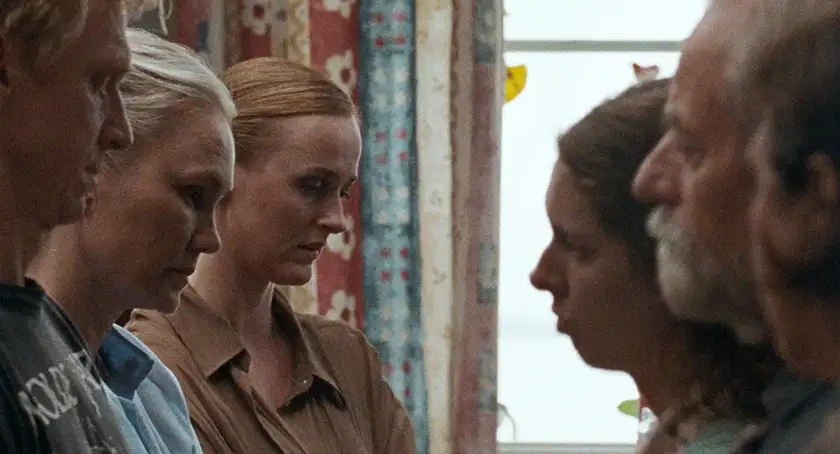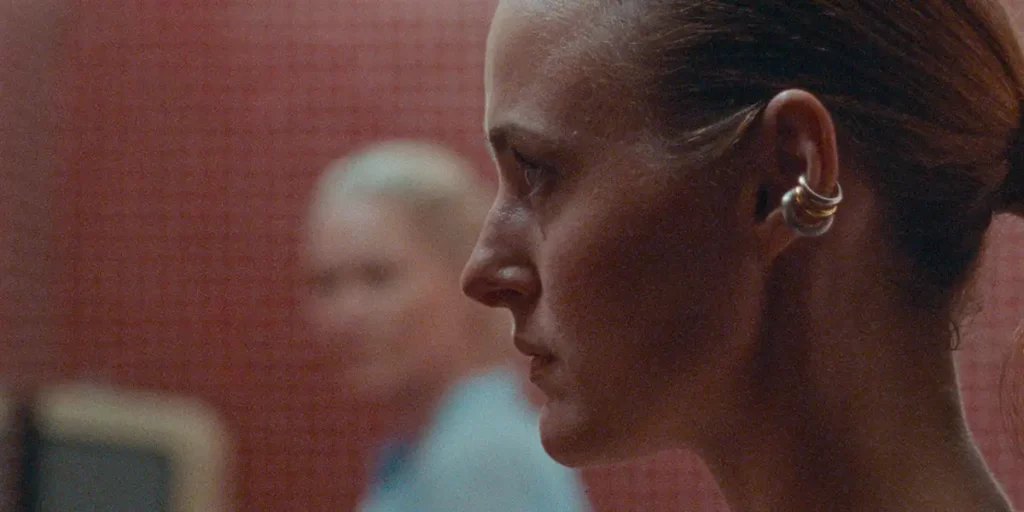Armand starts off strong with an incredible eye for atmosphere and tension, but the story fails to hold up when it gets too ambitious for its own good.
Director: Halfdan Ullmann Tøndel
Genre: Drama
Run Time: 116′
Edinburgh Premiere: August 21, 2024
U.S. Release Date: February 7, 2025 (limited) / February 14, 2025 (wide)
U.K. Release Date: TBA
Where to Watch: In theaters
At least on a certain level, Armand is an overwhelmingly simple film: it takes place mostly within the confines of an empty school in Norway, where the parents of two children are forced to meet to discuss an incident that occurred some days prior. The film begins very slowly, with director Halfdan Ullmann Tøndel taking precise care to establish an uneasy atmosphere, draping the viewer in the discomfort of this narrative and forcing us to figure out what’s happening in real-time.
It’s a film where the tensions and conflicts are obvious from the beginning, but the challenge of the story is understanding why these relationships are so fractured and unravelling the mystery of them. It’s a very dialogue-heavy experience, centering around these parents as they navigate the difficulties of parenthood, childhood trauma, and generational abuse.
This first hour is when Armand is at its strongest: Tøndel is an extremely talented director who clearly understands that the magic of this story lies in its simplicity and narrative coherence. Just sitting in this classroom with Elisabeth (Renate Reinsve, of The Worst Person in the World) and Sarah (Ellen Dorrit Petersen, of The Innocents) as they discuss their children’s incident is fascinating, primarily due to the quality of writing and the calibre of acting on display. It’s very naturalistic, with the dialogue pushing the story forward and revealing hints and clues with an obvious method and practice. The characters are complex, their motivations are made clear, and their relationships go through fine-tuned strain and disrepair as the narrative progresses.
Where Armand ultimately falters, however, is in its attempts to deviate too strongly from the structure that it sets up in the first act. As more and more secrets come to light, and the characters get progressively more emotional, Tøndel’s reliable, linear storytelling takes a major diversion into something far more abstract and surreal. While these sequences feature some beautiful visuals and evocative imagery, they unfortunately feel misplaced in a story that’s set itself up to be something else. The jump from such a naturalistic, dialogue-driven story into a more visual, interpretive structure is very jarring; it could certainly work in another environment, as Tøndel really knows what he’s doing with these scenes, but they simply don’t feel at-home here.

Thankfully, Armand manages to remain engaging from start to finish thanks to the ferocious performances on display. Renate Reinsve is hypnotising as Elisabeth, a defensive mother forced to reckon with the possibility that her child may not be the person she thought they were. She drifts effortlessly between terror, depression, hysterics, and debilitating frustration over the course of just two hours, with the film’s mostly real-time narrative making these transitions even more impressive. Ellen Dorrit Petersen and Endre Hellestveit are also incredible as Sarah and Anders, the parents of the alleged victim of the ambiguous incident. They know exactly how much emotion to display and how much to keep hidden, muffling their intentions and making their characters much more interesting.
Despite one glaring flaw, Armand is still an enjoyable and impressive feat of storytelling that navigates some fascinating concepts. The writing is strong enough to maintain the audience’s attention, using the gradual reveal of secrets to keep the momentum going from start to finish. But unfortunately, it bears all the marks of a director’s debut feature: it’s overambitious, slightly messy, and forces too many separate ideas into one story.
Armand was screened at the Edinburgh Film Festival on August 21, 2024 and will be released in select US theaters on February 7, 2025 and nationwide on February 14. Read our reviews of Monster (2023) and bluish!

